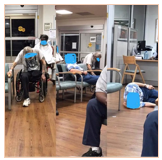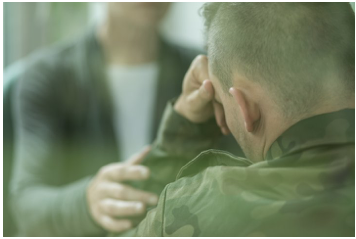CommentsWAR POLITICS--A veteran who had sought help from a Department of Veterans Affairs clinic in New Jersey killed himself in front of the building after his mental health needs were neglected, an investigation has found.
In a report released Wednesday by the VA’s Office of Inspector General, investigators determined that Charles Ingram III, a 51-year-old veteran who fought in the Gulf War, died by suicide last year after receiving inadequate care from the clinic. Missteps by the facility included a lack of communication between the patient and medical professionals and a lack of proper followup. Perhaps the most egregious incident was when Ingram, trying to schedule an appointment, was told he couldn’t be seen for more than three months.
Ingram ultimately took his own life in March 2016 by setting himself on fire in front of the clinic, shortly before his scheduled appointment.
The investigation came at the request of New Jersey Sen. Cory Booker (D), Sen. Robert Menendez (D) and Rep. Frank LoBiondo (R), who wanted the inspector general to “assess concerns that a patient’s insufficient access to timely mental health care may have contributed to the patient’s suicide.”
Ingram, a seven-year veteran of the U.S. Navy, had been going to the Atlantic County Community Based Outpatient Clinic in Northfield for several years, primarily to treat obsessive compulsive disorder. In late 2015, he was told it would be more than three months before he could get another appointment with a mental health professional. He had not been seen by a medical health professional for 11 months prior to his death, according to the report.
Investigators also found that clinic staffers “failed to follow up on clinic cancellations, patient no-shows, and appointments for approved care in the community, leaving the patient without follow-up appointments and refills for prescribed medications.”
Across the country, VA programs suffer from delayed provision of health care and backlogged disability claims. As recently as March, photos showed a man lying on the waiting room floor at a veterans hospital in North Carolina. Another waiting veteran was slouched over in a wheelchair, shaking with pain. The photos prompted an internal investigation.
 Prior to Ingram’s death, both family members and psychologists who had spoken to him did not think he was suicidal. During appointments from 2014 to 2015 with a psychologist, “it was noted he denied suicidal thoughts or ideas,” according to the investigation.
Prior to Ingram’s death, both family members and psychologists who had spoken to him did not think he was suicidal. During appointments from 2014 to 2015 with a psychologist, “it was noted he denied suicidal thoughts or ideas,” according to the investigation.
But while Ingram waited for his next appointment, he was “facing serious life stressors including a divorce and the loss of his job,” the report states. During this time, investigators said, Ingram did not try to contact VA staff to get an earlier appointment.
The veteran had also told family that staff at the clinic “did not return calls and were rude,” but investigators said they found no evidence of complaints filed with the facility.
Approximately 12 percent of Gulf War veterans have post-traumatic stress disorder in a given year, according to the Department of Veterans Affairs.
The inspector general’s office said schedulers at the New Jersey clinic have received more training, along with new supervisors and managers.
If you or someone you know needs help, call 1-800-273-8255 for the National Suicide Prevention Lifeline. You can also text HELLO to 741-741 for free, 24-hour support from the Crisis Text Line. Outside of the U.S., please visit the International Association for Suicide Prevention for a database of resources.
(Sebastian Murdock is a reporter for HuffPost … where this important report was first posted.)
-cw
















